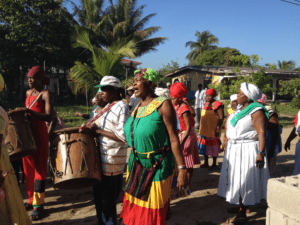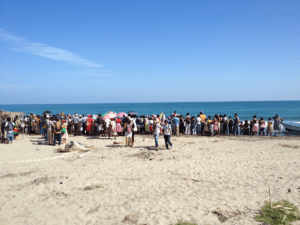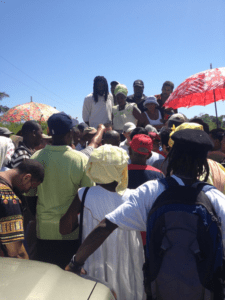Ancestral Territories, Human Rights & Climate Struggle: A Photo Blog from Honduras
Descendents of escapees from African slave ships and indigenous communities, the Garifuna people live on the Atlantic coast of Honduras. Their beautiful seascape and ecologically rich lands have attracted aggressive interest from foreign investors for plans ranging from tourist resorts to mining to industrial agriculture. But the Garifuna’s believe that without their lands, ocean and natural resources they cease to be people. Their collective land is part of who they are, and is critical to the survival of the Garifuna culture, and also the source of their resistance to the expansion of agrofuels, the construction of tourist projects, organized crime and other threats.
 Last August, Grassroots International had the privilege of being invited by our partner OFRANEH (the Black Fraternal Organization of Honduras) to Triunfo de la Cruz to serve as international observers during the site visit from the Inter-American Court of Human Rights (ICHR). OFRANEH has been working since 1981 to defend Garifunas’ economic, cultural, social ancestral territory rigths, including by presenting cases before the ICHR against the State of Honduras related to violations of territory rights of the Garífuna communities of Triunfo de la Cruz and Punta Piedra. These two communities are home to 48,000 Garifuna people. The Truinfo de la Cruz case brought more than 30 legal claims of land usurpation made by the Honduran elite and the Tela Municipality. The cases cite the lack of recognition of communities’ right to Free Prior and Informed Consent concerning the adoption of decisions affecting their ancestral territories. In particular, communities were denied a say in the proposed construction of tourism developments and megaprojects, the creation of a “protected area,” and sales of communal lands.
Last August, Grassroots International had the privilege of being invited by our partner OFRANEH (the Black Fraternal Organization of Honduras) to Triunfo de la Cruz to serve as international observers during the site visit from the Inter-American Court of Human Rights (ICHR). OFRANEH has been working since 1981 to defend Garifunas’ economic, cultural, social ancestral territory rigths, including by presenting cases before the ICHR against the State of Honduras related to violations of territory rights of the Garífuna communities of Triunfo de la Cruz and Punta Piedra. These two communities are home to 48,000 Garifuna people. The Truinfo de la Cruz case brought more than 30 legal claims of land usurpation made by the Honduran elite and the Tela Municipality. The cases cite the lack of recognition of communities’ right to Free Prior and Informed Consent concerning the adoption of decisions affecting their ancestral territories. In particular, communities were denied a say in the proposed construction of tourism developments and megaprojects, the creation of a “protected area,” and sales of communal lands.
 At an Inter-American Court and Commission of Human Rights public meeting in the Tela Municipality, members of the Garifuna communities presented moving and on-point testimonies about the land rights violations they have been facing for decades. The ICHR is expected to rule on the case in December of 2015.
At an Inter-American Court and Commission of Human Rights public meeting in the Tela Municipality, members of the Garifuna communities presented moving and on-point testimonies about the land rights violations they have been facing for decades. The ICHR is expected to rule on the case in December of 2015.
 Garifuna community members entrance to the Truinfo de la Cruz community center prior to the cultural event and spiritual ceremony to recieve the Inter- American Court and Commission of Human Rights.
Garifuna community members entrance to the Truinfo de la Cruz community center prior to the cultural event and spiritual ceremony to recieve the Inter- American Court and Commission of Human Rights.
 Garifuna dances and spiritual ceremonies are a critical part of their resistance to remain and claim their ancestral territories.
Garifuna dances and spiritual ceremonies are a critical part of their resistance to remain and claim their ancestral territories.
 Garifuna women participating in the spiritual ceremony to prepare the community for the Inter-American Court and Commision of Human Rights site visit.
Garifuna women participating in the spiritual ceremony to prepare the community for the Inter-American Court and Commision of Human Rights site visit.
 Garifuna community of Triunfo de la Cruz put forward claims to the State for (among other things) recognition of coastline and maritime territory, which are an essential part of the Garifuna economy and spirituality.
Garifuna community of Triunfo de la Cruz put forward claims to the State for (among other things) recognition of coastline and maritime territory, which are an essential part of the Garifuna economy and spirituality.
 Garifunas gathered to explain the land claims to the members of the Inter-American Court and Commission of Human Rights.
Garifunas gathered to explain the land claims to the members of the Inter-American Court and Commission of Human Rights.
 Drums and spiritual rituals accompanied the group every stop during the site visit.
Drums and spiritual rituals accompanied the group every stop during the site visit.
